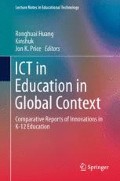Abstract
Working in partnership with Microsoft, a team of university faculty created the Technology Enriched Instruction (TEI) professional development workshop to promote the effective use of technology in the classroom. This workshop was originally aimed at teacher educators in an effort to support best practices based on theory and research about using technology in teaching. After piloting, the TEI workshop was extended to meet the needs of all higher education faculty. Two conceptual frameworks form the cornerstone of the workshop: TPACK and 21CLD. These frameworks provide the intellectual and practical grounding for all workshop activities. This chapter explores the application of TPACK and 21CLD as well as the decision-making behind and implications for expanding the focus of TEI.
Access this chapter
Tax calculation will be finalised at checkout
Purchases are for personal use only
References
Alsofyani, M. M., Aris, B. B., Eynon, R., & Majid, N. A. (2012). A preliminary evaluation of short blended online training workshop for TPACK development using technology acceptance model. Turkish Online Journal of Educational Technology—TOJET, 11(3), 20–32.
Archambault, L., Wetzel, K., Foulger, T. S., & Williams, M. K. (2010). Professional development 2.0: transforming teacher education pedagogy with 21st century tools. Journal of Digital Learning in Teacher Education, 27(1), 4–11.
Becker, M. R., McCaleb, K., & Baker, C. (2015). Paradigm shift toward student engagement in technology mediated courses. In Handbook of research on innovative technology integration in higher education (p. 74). Hershey, PA: IGI Global.
Besculides, M., Trebino, L., & Nelson, H. (2012). Successful strategies for educating hard-to-reach populations: Lessons learned from Massachusetts’ train-the-trainer project using the “Helping You Take Care of Yourself” curriculum. Health Education Journal, 71(3), 350–357.
Bull, G. (2010) The always connected generation. Learning & Learning with Technology, 38(2), 28–29.
Chamberlin, M., & Plucker, J. (2008). P-16 education: Where are we going? Where have we been? Phi Delta Kappan, 89(7), 472.
Koehler, M. J., & Mishra, P. (2008). Introducing TPACK. In AACTE Committee on Innovation and Technology (Eds.), Handbook of Technological Pedagogical Content Knowledge (TPCK) for Educators (pp. 3–30). NY: Routledge
Koehler, M. J., & Mishra, P. (2009). What is technological pedagogical content knowledge? Contemporary Issues in Technology and Teacher Education, 9(1). Retrieved from http://www.citejournal.org/vol9/iss1/general/article1.cfm.
Kukulska-Hulme, A. (2012). How should the higher education workforce adapt to advancements in technology for teaching and learning? The Internet and Higher Education, 15(4), 247–254.
Mishra, P., & Koehler, M. J. (2006). Technological pedagogical content knowledge: A new framework for teacher knowledge. Teachers College Record, 108(6), 1017–1054.
Moran, M., Seaman, J., & Tinti-Kane, H. (2011). Teaching, learning, and sharing: How today’s higher education faculty use social media. Babson Survey Research Group.
Pearce, J., Mann, M. K., Jones, C., van Buschbach, S., Olff, M., & Bisson, J. I. (2012). The Most effective way of delivering a train-the-trainers program: A systematic review. Journal of Continuing Education in the Health Professions, 32(3), 215–226.
Richardson, K. W. (2010). TPACK game on. Learning & Leading with Technology, 37(8), 34–35.
Roblyer, M. D., McDaniel, M., Webb, M., Herman, J., & Witty, J. V. (2010). Findings on Facebook in higher education: A comparison of college faculty and student uses and perceptions of social networking sites. The Internet and Higher Education, 13(3), 134–140.
Shulman, L. S. (1986). Paradigms and research programs in the study of teaching: A contemporary perspective. In M. C. Wittrock (Ed.), Handbook of research on teaching (3rd ed., pp. 3–36). New York: Macmillan.
Stover, S., & Veres, M. (2013). TPACK in higher education: Using the TPACK framework for professional development. Global Education Journal, 2013(1), 93–110.
Suhrheinrich, J. (2011). Examining the effectiveness of a train-the-trainer model: Training teachers to use pivotal response training. Evanston, IL: Society For Research On Educational Effectiveness. Retrieved from http://www.eric.ed.gov.prox.lib.ncsu.edu/contentdelivery/servlet/ERICServlet?accno=ED518863.
Acknowledgments
The authors wish to acknowledge Microsoft for their sponsorship of the TEI project. We also wish to acknowledge Dr. Mark Hofer, The College of William and Mary, and Dr. Jim Ptaszynski, The Bill and Melinda Gates Foundation, for the vital roles they played in this project.
Author information
Authors and Affiliations
Corresponding author
Editor information
Editors and Affiliations
Rights and permissions
Copyright information
© 2016 Springer-Verlag Berlin Heidelberg
About this chapter
Cite this chapter
Slykhuis, D.A., Lee, J.K. (2016). Using Two Frameworks to Promote E-Leadership and Teacher Development. In: Huang, R., Kinshuk, Price, J. (eds) ICT in Education in Global Context. Lecture Notes in Educational Technology. Springer, Berlin, Heidelberg. https://doi.org/10.1007/978-3-662-47956-8_12
Download citation
DOI: https://doi.org/10.1007/978-3-662-47956-8_12
Published:
Publisher Name: Springer, Berlin, Heidelberg
Print ISBN: 978-3-662-47955-1
Online ISBN: 978-3-662-47956-8
eBook Packages: EducationEducation (R0)

